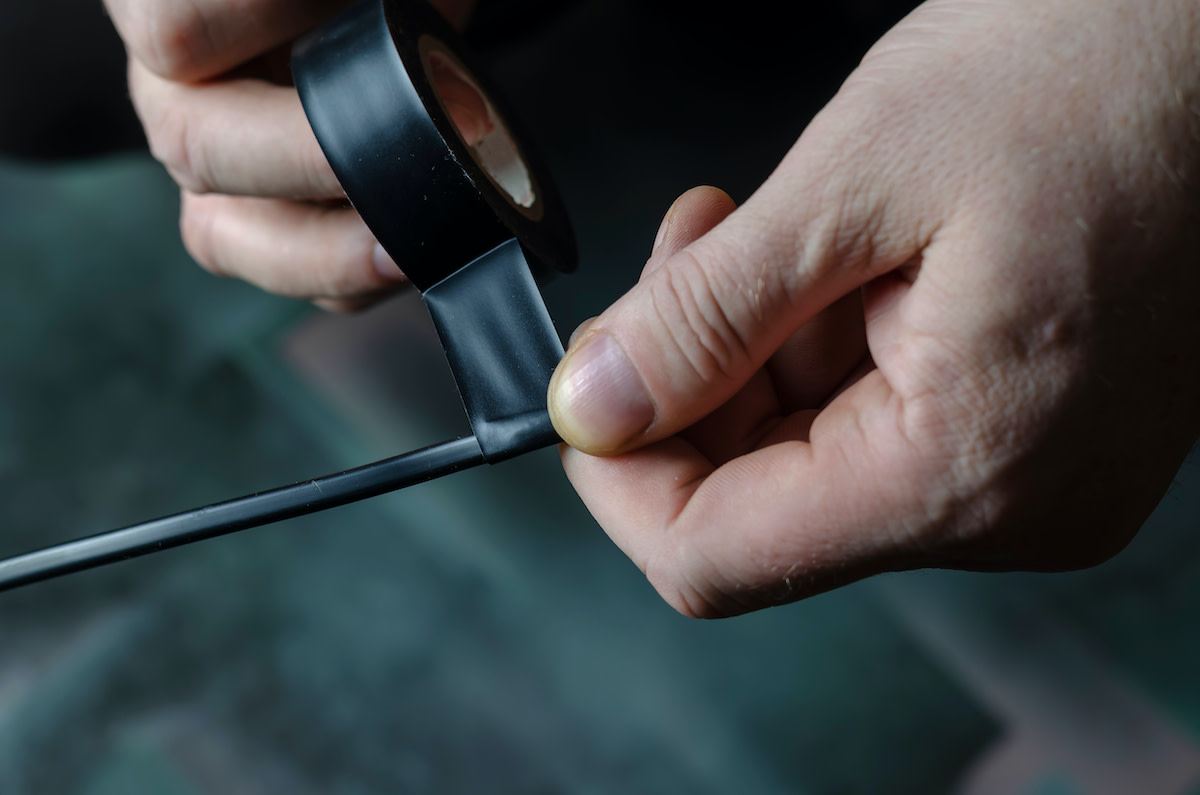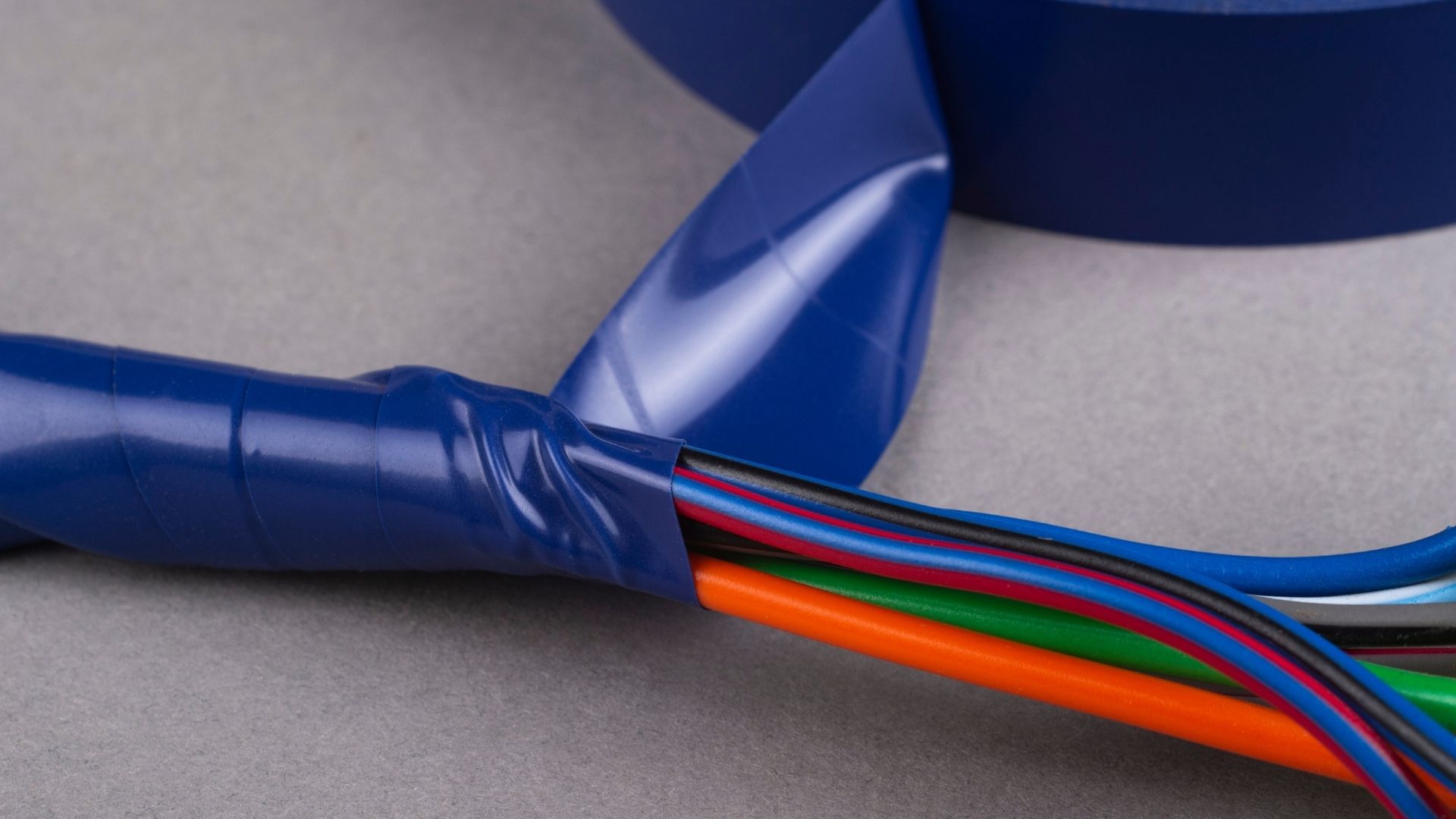Lessons I Learned From Tips About What Happens If You Use Normal Tape On Wires

Man Transforms Bathroom Using Only A Roll Of Electrical Tape Dengarden
The Sticky Situation
1. Why Duct Tape Isn't a Lifesaver Here
So, you've got a frayed wire, a roll of good ol' normal tape (maybe the kind you wrap presents with?), and a can-do attitude. Tempting, isn't it, to just slap some tape on there and call it a day? I get it. We've all been there, staring at a problem and hoping a quick fix will do the trick. But when it comes to electricity, "quick" and "good" rarely go hand in hand. Using normal tape on wires is generally a bad idea. Let's dive into why this seemingly harmless shortcut can lead to some pretty shocking (pun intended!) outcomes.
The core problem with normal tape — think your standard office tape, masking tape, or even most packaging tapes — is that it's simply not designed to handle the demands of electrical applications. Electrical wires generate heat. This heat will cause the adhesive on normal tapes to soften, melt, and lose its stickiness. The tape will then start to unwrap, exposing the wires again, which defeats the purpose entirely. It's like trying to patch a leaky pipe with a paper towel; it might seem like you're doing something, but the underlying problem is still very much there.
Furthermore, normal tape doesn't offer the necessary insulation to prevent electrical shocks or short circuits. Electrical tape is specifically formulated with a thicker, more durable, and non-conductive material. It's designed to withstand higher temperatures and provide a reliable barrier against electricity. Normal tape? Not so much. It's like comparing a flimsy raincoat to a professional-grade waterproof suit. One might keep you dry for a few minutes, but the other is built to handle serious weather.
And let's not forget about the potential for a sticky, gooey mess. Over time, the adhesive from normal tape can break down and leave a residue on the wires. This residue can attract dust and dirt, further compromising the insulation and potentially leading to corrosion. So, not only are you not fixing the problem, you're actually creating a new one — one that might be even harder to clean up later. This is why using proper electrical tape is important for safety and for the long term. It's better to do things right the first time than to create a bigger problem later.

How To Use Electrical Tape!🤔Unbelievable Well Tape Works
The Electrical Tape Difference
2. Why Electrical Tape Is Your Go-To
Electrical tape, on the other hand, is specifically engineered for this purpose. It's made from materials like vinyl or rubber that are excellent insulators, meaning they don't conduct electricity. This helps prevent shocks and short circuits, which are crucial for safety. Think of it as a specialized tool designed for a very specific job. You wouldn't use a butter knife to hammer a nail, would you? Similarly, you shouldn't use normal tape on wires when electrical tape is readily available.
Another key feature of electrical tape is its ability to withstand high temperatures. Wires can get hot, especially when they're carrying a lot of electricity. Electrical tape is designed to maintain its integrity and stickiness even in these conditions, providing a long-lasting and reliable solution. It's like having a superhero cape that doesn't melt in the sun. You need something that can handle the heat, and electrical tape is up to the task.
Electrical tape is also designed to be resistant to moisture and chemicals. This is important because wires can be exposed to all sorts of environmental factors, especially in outdoor or industrial settings. Electrical tape helps protect the wires from corrosion and degradation, extending their lifespan and ensuring reliable performance. It's like giving your wires a protective shield against the elements.
And finally, electrical tape is relatively inexpensive and easy to use. You can find it at any hardware store or online retailer. It's a small investment that can make a big difference in terms of safety and reliability. So, before you reach for that roll of normal tape, take a moment to consider the risks and benefits. Electrical tape is the right tool for the job, and it's worth having on hand for any electrical repairs or maintenance tasks.

The Potential Dangers
3. What Could Go Wrong? Quite a Lot, Actually
Let's talk about what could actually happen if you ignore this advice and use normal tape on wires. Picture this: the tape starts to peel, exposing the bare wire. Someone touches it. Zap! Not a pleasant experience, and potentially dangerous, especially for children or pets. The risk of electrical shock is real and should not be taken lightly.
Then there's the risk of a short circuit. If the exposed wire comes into contact with another conductor, it can create a sudden surge of electricity. This can damage your appliances, trip your circuit breaker, or even start a fire. Imagine your TV suddenly going up in smoke because of a poorly taped wire. It's not a pretty picture, and it's easily avoidable by using the correct materials.
And let's not forget about the long-term effects. Even if nothing dramatic happens immediately, the exposed wire can corrode over time, leading to a gradual decline in performance. This can cause your appliances to malfunction, your lights to flicker, or your electrical system to become unreliable. It's like a slow-motion disaster waiting to happen. And it all started with a simple decision to use the wrong tape.
Furthermore, using the wrong tape on electrical wiring can violate safety codes and regulations. If you're doing electrical work in your home, it's important to follow the proper procedures and use the correct materials. Otherwise, you could face fines or legal liabilities. It's simply not worth the risk. Always prioritize safety and use electrical tape for any electrical repairs or maintenance tasks. Think of it as protecting yourself, your family, and your property from potential harm.

DIY Done Right
4. Tips for Working with Electricity
Okay, so you're convinced normal tape is a no-go. Great! But what's the right way to handle those wires? First and foremost: safety first! Always turn off the power at the circuit breaker before working on any electrical wiring. This is non-negotiable. It's like buckling your seatbelt before driving. It's a simple precaution that can save your life.
Next, inspect the wires carefully. Look for any signs of damage, such as fraying, cracking, or corrosion. If the wires are damaged beyond repair, you may need to replace them entirely. If they're just slightly damaged, you can use electrical tape to insulate them properly. Make sure to wrap the tape tightly and overlap each layer to create a secure seal.
When using electrical tape, choose a high-quality product that is specifically designed for electrical applications. Look for tape that is UL-listed or has been tested and certified by a reputable organization. This will ensure that it meets the necessary safety standards. It's like buying a well-known brand of medicine versus something you found in a back alley. Quality matters, especially when it comes to safety.
If you're not comfortable working with electricity, it's always best to call a qualified electrician. Electrical work can be dangerous, and it's not worth risking your safety or the safety of your property. A licensed electrician has the knowledge, skills, and equipment to handle any electrical repairs or installations safely and efficiently. Think of it as hiring a professional to do a job that you're not qualified for. It's always better to be safe than sorry. And remember, electricity is not something to mess with unless you know what you are doing.

Frequently Asked Questions (FAQs)
5. Your Burning Questions Answered
Let's clear up some common questions about using tape on wires:
Q: Can I use duct tape instead of electrical tape?
A: Absolutely not! Duct tape is not designed for electrical applications and can pose a serious safety hazard. It's not heat-resistant, doesn't provide adequate insulation, and can leave a sticky residue that attracts dirt and moisture. Always use electrical tape for electrical repairs.Q: What kind of electrical tape should I use?
A: Vinyl electrical tape is the most common type and is suitable for most household applications. However, for more demanding applications, such as outdoor or high-temperature environments, you may want to consider using rubber electrical tape or a specialized high-temperature tape.Q: How do I properly wrap electrical tape around a wire?
A: Start by cleaning the wire to remove any dirt or debris. Then, wrap the tape tightly around the wire, overlapping each layer by about half. Continue wrapping until the damaged area is completely covered and the tape extends slightly beyond the damaged area on both sides. This will create a secure and waterproof seal.Q: Is it okay to use electrical tape on extension cords?
A: While electrical tape can provide a temporary fix for a damaged extension cord, it's not a permanent solution. If the cord is severely damaged, it's best to replace it entirely. And remember, never use electrical tape to repair a cord that is frayed or has exposed wires. This can be extremely dangerous.Q: What if I don't have any electrical tape?
A: If you don't have any electrical tape, it's best to avoid working on any electrical wiring until you can get some. In the meantime, you can use wire connectors or wire nuts to temporarily secure the wires. But remember, these are not permanent solutions, and you should always use electrical tape to properly insulate the wires as soon as possible.
